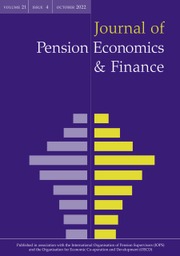Crossref Citations
This article has been cited by the following publications. This list is generated based on data provided by
Crossref.
Bucher-Koenen, Tabea
and
Ziegelmeyer, Michael Heinrich
2011.
Who Lost the Most? Financial Literacy, Cognitive Abilities, and the Financial Crisis.
SSRN Electronic Journal,
Alessie, Rob J.M.
Angelini, Viola
and
van Santen, Peter
2011.
Pension Wealth and Household Saving in Europe: Evidence from SHARELIFE.
SSRN Electronic Journal,
Bucher-Koenen, Tabea
2011.
Financial Literacy, Riester Pensions, and Other Private Old Age Provision in Germany.
SSRN Electronic Journal,
Fornero, Elsa
Monticone, Chiara
and
Trucchi, Serena
2011.
The Effect of Financial Literacy on Mortgage Choices.
SSRN Electronic Journal,
Pfarr, Christian
and
Schneider, Udo
2012.
Riester-Rente: (k)ein Kinderspiel!.
Vierteljahrshefte zur Wirtschaftsforschung,
Vol. 81,
Issue. 2,
p.
181.
Agnew, Julie
Bateman, Hazel
and
Thorp, Susan
2012.
Financial Literacy and Retirement Planning in Australian.
SSRN Electronic Journal,
Fort, Margherita
Manaresi, Francesco
and
Trucchi, Serena
2012.
Banks Information Policies, Financial Literacy and Household Wealth.
SSRN Electronic Journal,
Wobker, Inga
Lehmann-Waffenschmidt, Marco
Kenning, Peter
and
Gigerenzer, Gerd
2012.
What Do People Know About the Economy? A Test of Minimal Economic Knowledge in Germany.
SSRN Electronic Journal,
Lusardi, Annamaria
and
Mitchell, Olivia S.
2013.
The Economic Importance of Financial Literacy: Theory and Evidence.
SSRN Electronic Journal,
2013.
Global Financial Development Report 2014: Financial Inclusion.
p.
151.
Alessie, Rob
Angelini, Viola
and
van Santen, Peter
2013.
Pension wealth and household savings in Europe: Evidence from SHARELIFE.
European Economic Review,
Vol. 63,
Issue. ,
p.
308.
2013.
Global Financial Development Report 2014: Financial Inclusion.
p.
51.
Lusardi, Annamaria
and
Mitchell, Olivia S.
2013.
The Economic Importance of Financial Literacy: Theory and Evidence.
SSRN Electronic Journal,
LANDERRETCHE, OSCAR M.
and
MARTÍNEZ, CLAUDIA
2013.
Voluntary savings, financial behavior, and pension finance literacy: evidence from Chile.
Journal of Pension Economics and Finance,
Vol. 12,
Issue. 3,
p.
251.
Hastings, Justine S.
Madrian, Brigitte C.
and
Skimmyhorn, William L.
2013.
Financial Literacy, Financial Education, and Economic Outcomes.
Annual Review of Economics,
Vol. 5,
Issue. 1,
p.
347.
Potrich, Ani Caroline Grigion
Vieira, Kelmara Mendes
and
Ceretta, Paulo Sergio
2013.
Nível de alfabetização financeira dos estudantes universitários: afinal, o que é relevante?.
Revista Eletrônica de Ciência Administrativa,
Vol. 12,
Issue. 3,
p.
315.
Alessie, Rob J.M.
Angelini, Viola
and
van Santen, Peter
2013.
Pension Wealth and Household Savings in Europe: Evidence from Sharelife.
SSRN Electronic Journal,
Bucher-Koenen, Tabea
Lusardi, Annamaria
Alessie, Rob J.M.
and
<!>van Rooij, Maarten
2014.
How Financially Literate Are Women? An Overview and New Insights.
SSRN Electronic Journal,
Wobker, Inga
Kenning, Peter
Lehmann-Waffenschmidt, Marco
and
Gigerenzer, Gerd
2014.
What do consumers know about the economy?.
Journal für Verbraucherschutz und Lebensmittelsicherheit,
Vol. 9,
Issue. 3,
p.
231.
Clark, Gordon L.
2014.
Roepke Lecture in Economic Geography—Financial Literacy in Context.
Economic Geography,
Vol. 90,
Issue. 1,
p.
1.


